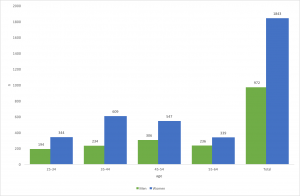Noncommunicable diseases such as cardiovascular diseases (CVD), diabetes, chronic obstructive pulmonary disease (COPD) have a burgeoning burden in Nepal. According to the Global Burden of Disease study 2016, CVDs and COPD are respectively the leading cause of death in men and women. Country’s surveillance system as such the health information management system (MIS) does not include NCD indicators, neither does the periodic surveys done in the past. Learning from the efforts in the UK, China and other countries in building national databases and registries for data capturing and linkages, Nepal Biobank aims to link individual patient data collected from primary studies and help facilitate researchers to use these data for boosting research collaborations in the country. Further, it has its own periodic data feeding process, where data from its own periodic surveys will be harmonized.
Nepal Biobank is established by Nepal Development Society–a leading civil society organization that focuses on solving critical public health and social development needs in Nepal through scientific research and innovation. Since 2013, NeDS has established a cohort of 3,000 rural households as a public health laboratory to conduct epidemiology studies as well as assessments of Nepalese healthcare system with a focus on the PHC level. Over the past years, NeDs contributed to collaborative research with several national and international organizations including the Nepal Ministry of Health and Population, Aarhus University (Denmark), Lancet Commission on Hypertension, Centers for Disease Control and Prevention (USA), World Diabetes Foundation; Johns Hopkins University (USA); University of New South Wales (Australia), and Harvard T. H. Chan School of Public Health (USA), and published over 50 scientific articles in national and international peer-reviewed journals, making it the leading organization generating and disseminating health-related evidence in Nepal.


Objectives
The objective of Nepal Biobank is to, i) capture existing discrete data on a broad range of NCD risk factors and determinants, ii) foster synergy and collaboration between Nepalese researchers locally, as well as scholars around the globe.